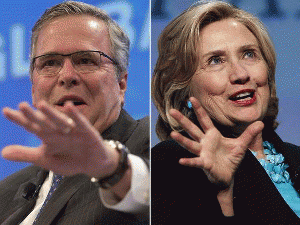Reprinted from Robert Reich Blog
"He can't possibly win the nomination," is the phrase heard most often when Washington insiders mention either Donald Trump or Bernie Sanders.
Yet, as enthusiasm for the bombastic billionaire and the socialist senior continues to build within each party, the political establishment is mystified.
Political insiders don't see that the biggest political phenomenon in America today is a revolt against the "ruling class" of insiders that have dominated Washington for more than three decades.
In two very different ways, Trump and Sanders are agents of this revolt. I'll explain the two ways in a moment.
Don't confuse this for the public's typical attraction to candidates posing as political outsiders who'll clean up the mess, even when they're really insiders who contributed to the mess.
What's new is the degree of anger now focused on those who have had power over our economic and political system since the start of the 1980s.
Included are presidents and congressional leaders from both parties, along with their retinues of policy advisors, political strategists, and spin-doctors.
Most have remained in Washington even when not in power, as lobbyists, campaign consultants, go-to lawyers, financial bundlers, and power brokers.
The other half of the ruling class comprises the corporate executives, Wall Street chiefs, and multi-millionaires who have assisted and enabled these political leaders -- and for whom the politicians have provided political favors in return.
America has long had a ruling class but the public was willing to tolerate it during the three decades after World War II, when prosperity was widely shared and when the Soviet Union posed a palpable threat. Then, the ruling class seemed benevolent and wise.
Yet in the last three decades -- when almost all the nation's economic gains have gone to the top while the wages of most people have gone nowhere -- the ruling class has seemed to pad its own pockets at the expense of the rest of America.
We've witnessed self-dealing on a monumental scale -- starting with the junk-bond takeovers of the 1980s, followed by the Savings and Loan crisis, the corporate scandals of the early 2000s (Enron, Adelphia, Global Crossing, Tyco, Worldcom), and culminating in the near meltdown of Wall Street in 2008 and the taxpayer-financed bailout.
Along the way, millions of Americans lost their jobs their savings, and their homes.
Meanwhile, the Supreme Court has opened the floodgates to big money in politics wider than ever. Taxes have been cut on top incomes, tax loopholes widened, government debt has grown, public services have been cut. And not a single Wall Street executive has gone to jail.
The game seems rigged -- riddled with abuses of power, crony capitalism, and corporate welfare.
(Note: You can view every article as one long page if you sign up as an Advocate Member, or higher).






